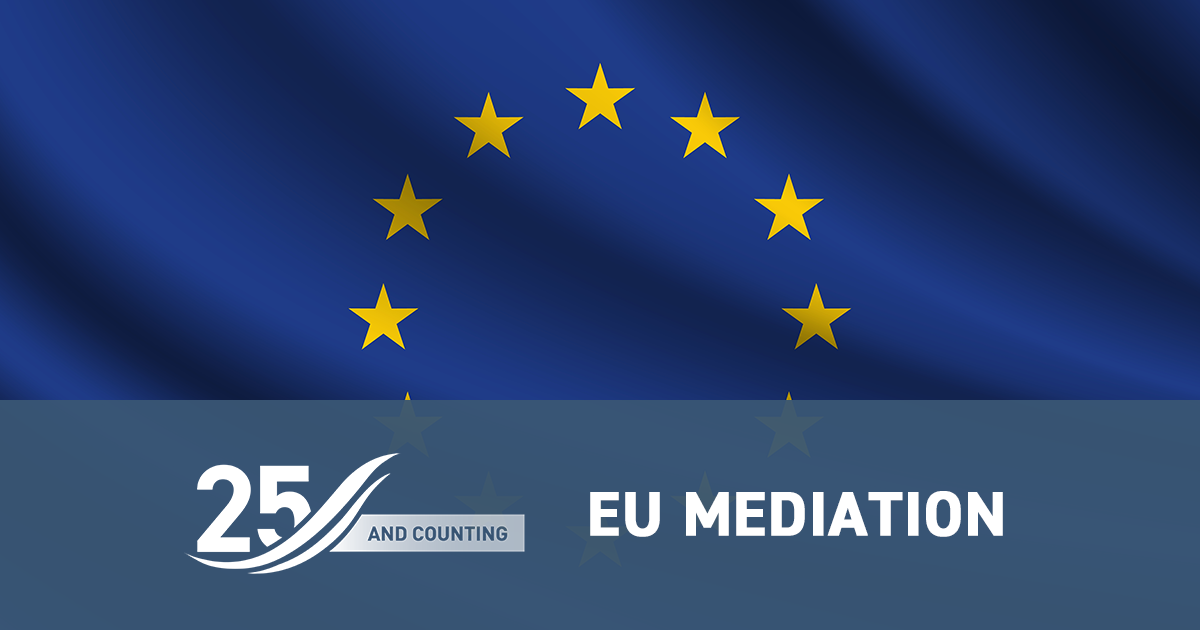
Posted on: September 16th, 2024

To celebrate our 25th Anniversary this year, we sit down with Founder, Dr Mike Talbot, to look back at some of the key moments in UK Mediation's history.
In this ninth entry, we look back at the launch of EU Mediation, the company's European sister organisation.
1. In November 2022, UK Mediation's sister organisation EU Mediation was launched. What was the catalyst for this expansion?
Dr Mike Talbot: Part of the client base that we had built up in mainland Europe by that time included organisations funded centrally by EU money. So, organisations in the health, energy, and education sectors in particular were those larger entities working across the whole of the EU and essentially financed from Brussels. Understandably, after the disaster that was Brexit, the EU did not want to spend its Euros on services from non-EU countries, so we felt the need to launch EU Mediation, based in County Cork in the Republic of Ireland, working in Euros, and able to respond much more specifically to the needs of our EU-based clients.
2. How does it work for organisations based in mainland Europe?
MT: We have had a lot of business over the years with organisations in mainland Europe who could be broadly classified as either international centres of excellence, or multinational companies. These clients tend to work in English and have exactly the same kinds of challenges that UK organisations also face. So, we are able to support these organisations either with services like mediation or conflict coaching, or training courses such as Confident Conversations, Workplace Mediation Skills, or Manager as Mediator.
The way it works is pretty similar to the UK, so organisations can either undertake training and skills development with us, online or-face-to-face, or they can use our mediators for resolving all kinds of disputes without resorting to formal action. These options have proven to be highly effective in avoiding formal processes, keeping employees working well together, and building people’s confidence and competence in avoiding and addressing interpersonal fall-outs.
And there is no problem with us travelling to mainland Europe to deliver our services: we do it all the time!
3. Following the launch, EUM has worked with a number of high-profile multinational organisations. Are there any particular 'success stories' that stand out?
MT: Well, if I were to pick just three…
We have a great and ongoing relationship with the Innovative Health Initiative (IHI) in Brussels, and have been back to deliver a whole range of training courses for them; we first started working with The United Nations in Geneva over a decade ago, and continue to be closely involved with their endeavours to manage workplace conflict better, and our work with the International Atomic Energy Authority in Vienna has also gone from strength to strength in the last 15 years or so.
But something that is interesting in recent years is how more and more organisations, once they have used our mediation services and know what great results and savings we can deliver, they are tending to sign up for a Service Level Agreement: where they buy in advance a ‘ticket’ for a number of mediation cases, and use then up as they need to. It means the mediation case referral and ordering process is greatly streamlined, because there doesn’t have to be a new purchase order each the organisation wants another case. Ultimately, response times can be brought down to about five days from referral to completion, and everybody wins.
4. What are the long-term goals for EU Mediation? Any further plans for expansion?
MT: The obvious way to go with EU Mediation will be to offer services in languages other than English, so I think that will be a development in years to come. At the moment, we are offering shorter skills courses and mediation services in just English, and that fits the bill well. But in order to reach further, I think we need to add other languages, perhaps going country by country.
And the other strand of the work that is developing is in training and accrediting professional mediators, as opposed to just upskilling managers and others to address conflict more positively. And given that we are one of the few organisations accredited with the International Mediation Institute (IMI) to be able to do this, I think we are in a great place to think about expansion over the next 25 years!